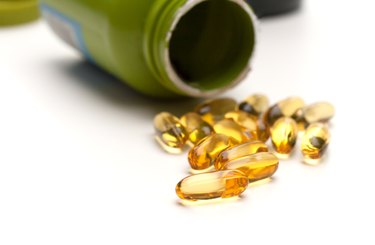
Your body uses sunlight to produce vitamin D. A few foods also provide the nutrient, including some products, such as milk and breakfast cereal, that are enriched with the vitamin. Vitamin D is also available as a dietary supplement. Although the pill is generally safe, do not take it unless your doctor determines that vitamin D supplementation can benefit you. Some people on high doses of vitamin D experience nausea.
Vitamin D Intake
Video of the Day
The Food and Nutrition Board of the Institute of Medicine determines how much vitamin D individuals should take in daily. At birth, babies need 10 mcg of the nutrient in their diet. Starting at 1 year until 70 years of age, individuals require 15 mcg of vitamin D daily. When you turn 71, raise your intake to 20 mcg. Keeping to these limits reduces the risk of nausea and other possible side effects.
Video of the Day
Intoxication Prevention
Nausea is a bothersome but mostly harmless side effect of taking high doses of vitamin D. More serious conditions caused by vitamin D intoxication -- bone loss, kidney stones and hardening of the heart and kidneys -- are also possible. To prevent toxicity and potentially fatal health problems, the Food and Nutrition Board established an upper intake level for vitamin D to indicate where the safety zone lies. The maximum safe dose from birth to 6 months is 25 mcg daily. Between their sixth month and twelfth month of life, children tolerate up to 37.5 mcg of vitamin D daily. From 1 to 3 years of age, kids can take as much as 62.5 mcg of the nutrient if a pediatrician recommends supplementation. Starting at 4 years of age, the limit rises to 75 mcg daily. When children turn 9 years old, the vitamin D upper intake level for them goes up to 100 mcg. It stays at that limit through adulthood.
Avoiding Nausea
The vitamin D your body makes from sunlight does not cause side effects. Symptoms are not linked to eating foods that contain the nutrient, either. Adverse reactions occur when you supplement vitamin D in high doses. If you maintain a normal supply of vitamin D, you avoid the need for supplementation and the potential nausea. Try to spend 45 minutes -- up to three hours if your skin is dark -- in the sun weekly, University of Maryland Medical Center recommends. In addition, eat foods that offer the nutrient. Salmon, herring and other fatty fishes are good natural sources; so are eggs and enriched milk. If your doctor recommends supplementation, do not take more than the dose she prescribes.
Other Considerations
Contact your doctor if you feel nauseated after taking the vitamin D dosage she prescribed. Do not dismiss the symptom. Your doctor may need to adjust your prescription or investigate the cause of your gastric problem.